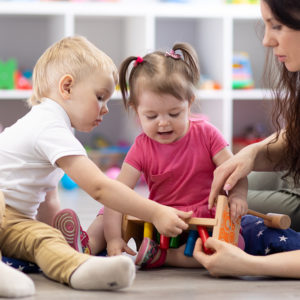The American people are grappling with intersecting crises — from the coronavirus pandemic and economic crisis that has cost tens of millions of Americans their jobs to the unrelenting child care crisis, and the centuries-long struggle for racial and gender justice.
During the presidential debates, people deserved to hear about the policy solutions needed to support communities and make them more inclusive and equitable.
Unfortunately, many of the issues which keep Americans up at night were overshadowed, including the crisis facing the industry which upholds so many others — child care.
The debates should have included questions about candidates’ plans for saving the child care industry, because the value we place on child care is a mirror into what kind of society we want to build.
How do they plan to stabilize the industry from the ravages of the pandemic? How will they build a better child care system which pays educators livable wages and makes quality, affordable care accessible to families?
When the pandemic began, Dasja Reed’s child care program closed before her job, which meant she could not work. When she was called back to work, her son’s child care center had closed permanently.
As she searched for other programs, each one told her they did not have room due to COVID safety precautions.
Dasja said there’s nothing she wouldn’t do to put her son in a quality, affordable child care program where she knows he’s being well cared for, but the lack of federal support for child care left her, like so many others, without options.
Many parents have struggled to work from home or on different schedules without access to their regular child care.
Nearly 40 percent of child care programs said they’d have to close permanently without additional public assistance.
Eight months into a pandemic and economic downturn, child care providers have not received the support they need to survive. The pandemic revealed child care as the backbone upon which much of our nation’s productivity rests.
Even in the absence of a pandemic, the U.S. economy loses $57 billion annually in earnings, productivity, and revenue due to workers’ child care-related disruptions. Access to quality child care is a crucial component in the United States’ economic recovery.
And yet, the industry is on the brink of collapse. As of August, 20 percent of child care providers had lost their jobs and the mostly women working as child care providers are 2.5 times as likely as those in other fields to be Black or Latina, people whose communities have been hit hardest by the pandemic.
Recent research also shows the impact of the coronavirus child care crisis on maternal workforce participation.
Millennial moms (largest generation in the workforce) are three times more likely than millennial fathers to report being unable to work due to a school or child care closure.
Between August and September, 865,000 women dropped out of the labor force. How many were forced to do so because of child care responsibilities? Without real relief, the United States could lose half of its child care capacity.
Child care providers who do remain open are operating with lower enrollment and greater expenses.
Given these realities, it’s no wonder support for child care is a major priority for voters. A recent study found that forty-five percent of parents say that they or their family members have had trouble finding child care when needed and an equal proportion of parents have had to cut back their work hours or been unable to return to work.
These findings underscore why, given the stresses of a pandemic, six in 10 voters (including non-parents) favor a strong role for the government in helping families get reliable, affordable child care so parents can work.
Overall, seven in 10 voters support Congress increasing funding for child care and early education.
Child care is, was, and always will be essential. It’s also a gender and racial justice issue. Lack of access to quality, affordable child care holds families back financially and impairs America’s economic growth.
The American people deserve to hear how the next president will help child care survive the pandemic and build a better, more accessible and inclusive system.

